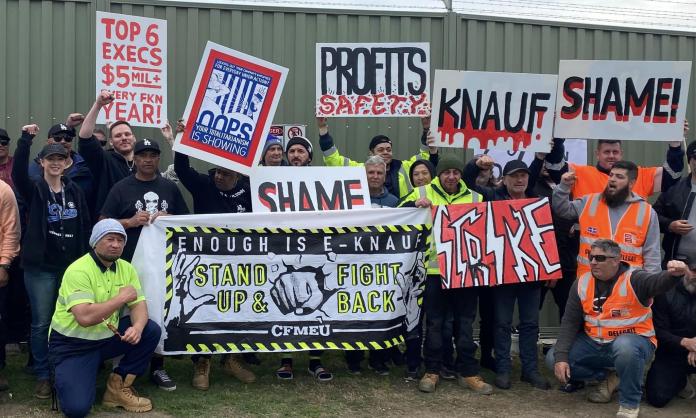In late August, around 50 union members at Knauf plasterboard held a meeting in their Melbourne factory to discuss recent EBA negotiations, which had begun a few months earlier. A new HR manager insisted on attending the meeting and wasted people’s time explaining the wonderful job that company management had done taking care of the workers, in particular their recent and significant safety concerns. As he spoke, one after another the workers turned their backs on him. Soon, they began challenging the manager about a worker who had just been sacked.
At one point, someone said, “You’re a production manager, you really need to know this. This is the workers. These are the people you work to. Their opinion matters”. After a brief silence, another worker called out: “We’re the ones that make the board!” Cue the shuffling of HR manager feet before a chant of “Shame Knauf shame!” was taken up and HR quickly left the scene.
This is not an average Australian workplace. The scenes are the stuff of dreams for millions of fed-up workers who would love to see their own snot-nosed bullies from HR served humble pie—and to be part of serving it up.
The workers at Knauf have won above-average conditions in the past through being union strong. In August, they voted unanimously to reject a company offer and have confidently begun work bans and short stop-work actions to increase the pressure on management to meet their demands.
One Knauf worker at the picket line explained that they want to do more than preserve what they have:
“This pay rise is for my family—that’s why I am here with my family. Of course we don’t want to go backward on our hard-won conditions, but we need to gain things after four years as we made these massive profits for this company since the last EBA.”
The Knauf workers have confidence in the demands they’ve put forward, which include pay rises that match or outpace inflation, better superannuation payments and a laundry service to help keep workers and their families safe from toxic materials. They know that Knauf holds a huge share of the plasterboard market during a construction boom and that their wages and conditions should reflect that.
They know that their work is skilled and specialised, and that their opinions and wishes should be respected. They know that the company can afford to pay them more: Knauf has raised the price of its products by around 20 percent in the last year and the German family of billionaires who owns the company recently bought a $7 million painting for their private art gallery.
On 15 September, after another inadequate company offer was rejected by workers, Knauf management shut down the site, locking out the workforce without pay. In response, union members called an indefinite strike and are picketing the workplace daily.
An increasingly important issue in the conflict is the efforts of management to use casual and labour-hire workers at the site. This would take shifts and jobs away from the current workforce, break up the unity that has been built between workers, undercut the conditions of one shift and section at a time, and weaken the workers’ collective action in the future.
“The company always wants to divide us by sections, shifts and workgroups”, a Knauf CFMEU delegate told Red Flag. “We are united among ourselves, our claims for all shifts, sections and groups. That’s why we rejected their offers 100 percent. We must stay united. I have been working here for over twenty years and it’s not about me anymore but for these young workers. That’s why I don’t want this place to flood with labour hire as many other workplaces nowadays.”
The Knauf workers have a power and level of organisation that could win them significant improvements. That would be an inspiration to workers everywhere. And their approach to solidarity and determined collective action would provide a model for others to follow. There are likely more twists and turns in the dispute, but if we’re to reverse the decades of declining pay and worsening conditions that Australian workers have faced, then the organised will need to take a lead.
Being a fully unionised workplace where people win what they deserve doesn’t happen easily or overnight. It also doesn’t continue without hard work, solidarity and daring.
“The secret is we can win because we are well organised and 100 percent unionised”, A younger CFMEU member said. “I am new here. I enjoy the pay and condition that were won by the others, so this is my opportunity to keep fighting to pass them to the next generation.”
Donate to the strike fund supporting Knauf workers at knauf-lockout-fund.raisely.com.










